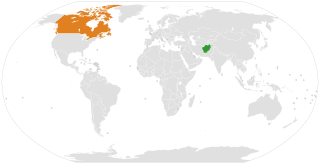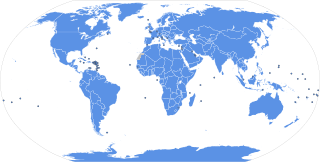
The International Security Assistance Force (ISAF) was a multinational military mission in Afghanistan from 2001 to 2014. It was established by United Nations Security Council Resolution 1386 pursuant to the Bonn Agreement, which outlined the establishment of a permanent Afghan government following the U.S. invasion in October 2001. ISAF's primary goal was to train the Afghan National Security Forces (ANSF) and assist Afghanistan in rebuilding key government institutions; however, it gradually took part in the broader war in Afghanistan against the Taliban insurgency.
Operation SUPPORT is the name given to Canadian Forces activities directly after the terrorist attacks of September 11, 2001. The CF had two immediate goals: to provide support for stranded aircrew and passengers from diverted commercial flights, and to increase emergency preparedness. Transport Canada called their operation Yellow Ribbon.
Operation Athena was the Canadian Forces' contribution to the International Security Assistance Force (ISAF) in Afghanistan. The operation was divided in two phases: the first one took place from July 2003 to July 2005 in the Kabul region and the second one from August 2005 to December 2011 in the Kandahar area. The operation's main objective was to improve Afghanistan's security and governance. Operation Athena in Kandahar constituted the longest combat mission in the history of Canadian Forces. With over 40,000 Canadian military units that, at some point, entered the country—often several times—this operation constitutes the largest military deployment of the Canadian Forces since World War II.

The United Nations Mission in Sierra Leone (UNAMSIL) was a United Nations peacekeeping operation in Sierra Leone from 1999 to 2006. It was created by the United Nations Security Council in October 1999 to help with the implementation of the Lomé Peace Accord, an agreement intended to end the Sierra Leonean civil war. UNAMSIL expanded in size several times in 2000 and 2001. It concluded its mandate at the end of 2005, the Security Council having declared that its mission was complete.

The United Nations Assistance Mission in Afghanistan (UNAMA) is a UN Special Political Mission established to assist the state and the people of Afghanistan in laying the foundations for sustainable peace and development.
The Afghan New Beginnings Programme aimed to disarm, demobilise and reintegrate thousands of combatants from the Afghan Militia Forces/Afghan Army and provide them opportunities to join the Afghan National Army, Afghan National Police or an alternative line of work. The government of Afghanistan and the ANBP estimated that there might be 100,000 former combatants who could be integrated into civilian life.
Canada's role in the Afghanistan War began in late 2001. Canada sent its first element of soldiers secretly in October 2001 from Joint Task Force 2, and the first contingents of regular Canadian troops arrived in Afghanistan in January–February 2002. Canada took on a larger role during the Afghan conflict starting in 2006 after the Canadian troops were redeployed to Kandahar province. 2,500 Canadian Forces (CF) personnel were in Afghanistan and 1,200 made up the combat battle group. At the 2012 NATO Summit in Chicago, Prime Minister Stephen Harper announced that an undisclosed number of Canadian soldiers would remain in the country to help train and mentor the Afghan National Army until 12 March 2014.
The Iceland Crisis Response Unit (ICRU) or Íslenska Friðargæslan, is an Icelandic para-military unit with a capacity roster of up to 200 people, of whom about 30 are active at any given time. It is operated by the Icelandic Ministry of Foreign Affairs. It is primarily designated for peacekeeping operations and was established in the 1990s to participate in operations and peacekeeping projects, including in support of NATO peacekeeping operations. That role later evolved into providing an appropriate forum for deploying personnel within other organizations such as with OSCE field missions as well as with UN DPKO, and organizations such as UNIFEM, UNRWA and UNICEF.
During the War in Afghanistan, over 47,245 civilians, 66,000 to 69,000 Afghan military and police and more than 51,000 Taliban fighters have been killed as of April 2021. Overall the war has killed 171,000 to 174,000 people in Afghanistan. However, the death toll is possibly higher due to unaccounted deaths by "disease, loss of access to food, water, infrastructure, and/or other indirect consequences of the war." The Cost of War project estimated that the number who have died through indirect causes related to the war may be as high as 360,000 additional people based on a ratio of indirect to direct deaths in contemporary conflicts.

Afghanistan and Canada established diplomatic relations in 1968. In 2003, Canada opened its embassy in Kabul and appointed its first resident ambassador. Afghanistan appointed its first resident ambassador to Canada in 2002. In August 2021, Canada closed its embassy in Kabul with the return of the Taliban to power in Afghanistan.

Canada–Haiti relations are relations between Canada and the Republic of Haiti. Both nations are the only independent French speaking countries in the Americas. During the unsettled period from 1957 to 1990, Canada received many Haitian refugees, who now form a significant minority in Quebec. Canada participated in various international interventions in Haiti between 1994 and 2004, and continues to provide substantial aid to Haiti. Both nations are members of the Organisation internationale de la Francophonie, Organization of American States and the United Nations.
Brigadier General Anthony Thomas Stack, OMM, CD is a Brigadier General in service of the Canadian Forces. He is the Deputy Commander of the Land Force Atlantic Area.

United Nations Security Council resolution 1536, adopted unanimously on 26 March 2004, after reaffirming all resolutions on the situation in Afghanistan, particularly Resolution 1471 (2003), the council extended the mandate of the United Nations Assistance Mission in Afghanistan (UNAMA) for an additional period of twelve months until 26 March 2005.

The United Nations Police (UNPOL) is an integral part of the United Nations peace operations. Currently, about 11 530 UN Police officers from over 90 countries are deployed in 11 UN peacekeeping operations and 6 Special Political Missions. The "mission of the UN Police is to enhance international peace and security by supporting Member States in conflict, post-conflict and other crisis situations to realise effective, efficient, representative, responsive and accountable police services that serve and protect the population".
The 2011 Mazar-i-Sharif attack occurred on 1 April 2011 when a group of demonstrators attacked the United Nations Assistance Mission in Afghanistan (UNAMA) compound in Mazar-i-Sharif, Afghanistan, killing seven foreigners, including three United Nations staff members and four Nepalese guards. Additionally, five protesters died in the violence.

The United Nations Special Service Medal (UNSSM) is presented to personnel with 90 days of service with a United Nations mission not covered by a specific United Nations Medal. United Nations Headquarters service is not eligible.

39 Signal Regiment, formerly known as 744 Signal Regiment in Vancouver, 741 Signal Squadron in Esquimalt and 748 Signal Squadron in Nanaimo, is a Primary Reserve Canadian Army unit of the Royal Canadian Corps of Signals in Vancouver, Victoria and Nanaimo, British Columbia.







